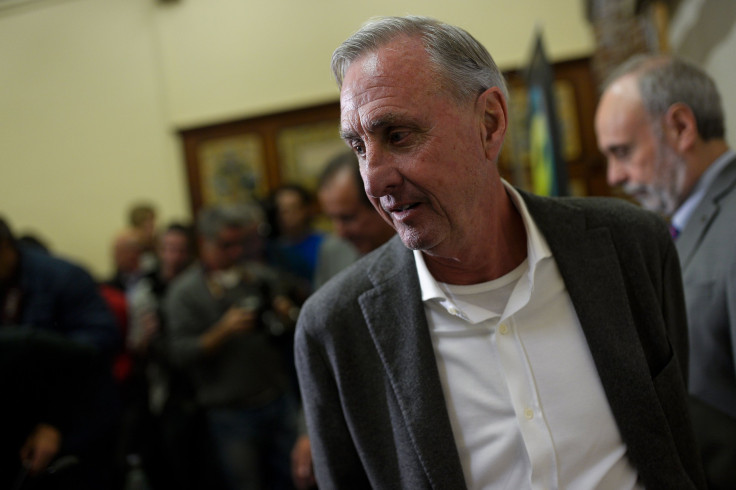Johan Cruyff Dies Aged 68: Barcelona And Ajax Legend Had Battled Cancer

Johan Cruyff, a three-time world player of the year as a player, a European Cup winner as a coach and one of the most influential figures in the history soccer, has died from cancer. He was 68.
The Dutchman, a heavy smoker until being forced to undergo double heart bypass surgery in 1991, revealed that he was suffering from lung cancer in October of last year, but just last month had stated that he was “2-0 up” in his battle against the illness.
“On March 24 2016 Johan Cruyff (68) died peacefully in Barcelona, surrounded by his family after a hard fought battle with cancer,” read a short statement on the World of Johan Cruyff website. “It’s with great sadness that we ask you to respect the family’s privacy during their time of grief.”
Regarded as one of the greatest players of all time, Cruyff came up through the ranks of Dutch club Ajax, who he inspired to three consecutive European Cup triumphs between 1971 and 1973. He was also the emblematic figure of the Holland side that revolutionized the way the game was played with a style known as “Total Football.”
In the World Cup of 1974 he became a true global star, not least for inventing a trick that lives on today: the Cruyff Turn. It was a move, subtly deceiving a defender with a sudden drop of the shoulder and a flick of the ball back with his instep, that embodied the flair that in combination with his long hair and rejection of authority made him a style icon that transcended soccer in the 1970s.
He helped Holland reach the World Cup final in 1974, where his team was agonizingly beaten by Germany to go down as one of the greatest sides not to win the World Cup. Cruyff would never get his hands on the trophy, having retired from international soccer before the 1978 World Cup due to fear for his family’s safety, particularly traveling to Argentina, which was then under military dictatorship.
By the time of the 1974 World Cup, he had already completed a move to Spanish giants Barcelona, the other club, along with Ajax, with which he enjoyed a powerful decades-long association.
He won a league title at the Catalan club, but his influence upon the club ran far deeper. He returned as a coach in 1988, inspiring them to their first ever European Cup in 1992 with a side that became known as “the dream team.” Already he had been the man behind the creation of the club’s now famed academy. La Masia has since produced players that have been the bedrock of the club’s dominance of European soccer in recent years, including Lionel Messi, Xavi and Andres Iniesta.
More than that, though, Cruyff reintroduced the Total Football style of short passing, high pressing play that had originally been brought to the club by fellow Dutchman, and his own mentor, Rinus Michels. It was that philosophy which was the foundation for two of Cruyff's former players, Frank Rijkard and Pep Guardiola, as well as Luis Enrique, to lead Barcelona to four European Cup victories in the past decade.
But Cruyff’s influence stretched wider still. Last season, half of the teams in the Champions League quarterfinals were coached by players who had been at Barcelona in the 1990s and influenced in some way by Cruyff. Quite simply he forever changing the way the game is played.
We'll always love you, Johan. Rest in peace
— FC Barcelona (@FCBarcelona) March 24, 2016
https://t.co/OOKLgPnAyv
© Copyright IBTimes 2024. All rights reserved.











